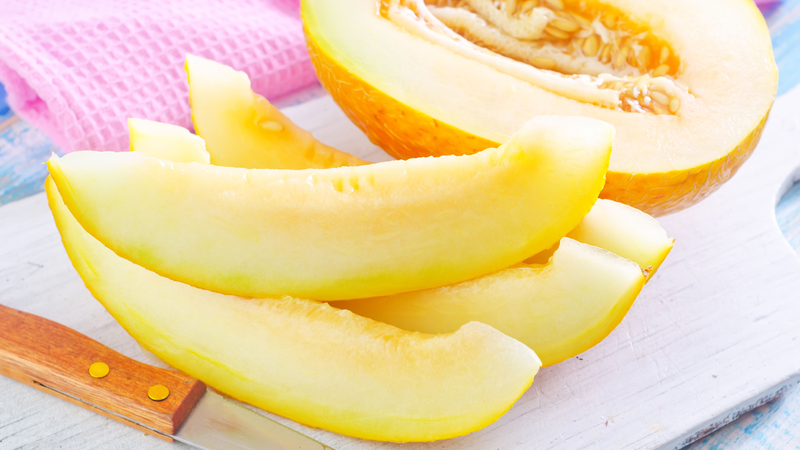Cantaloupe is a cooling fruit that many people love. However, many people experience bitterness when eating cantaloupe. So can bitter cantaloupe be eaten? This article will help you answer this question.
Cantaloupe is a nutritious fruit, loved by many people for its sweet, refreshing taste. However, sometimes cantaloupe can taste bitter, making many people wonder whether it is safe to eat or not. The following article will help you better understand the reasons why cantaloupe is bitter, as well as notes when using it to ensure health safety.
Benefits of cantaloupe
Cantaloupe is a refreshing, easy-to-eat fruit that is very popular in the summer. Not only does it have a sweet taste, cantaloupe also contains many nutrients, bringing many health benefits. Here are some of the health benefits of cantaloupe:
Cancer Prevention
Cantaloupe is a rich source of antioxidants such as beta-carotene and vitamin C, which can neutralize harmful free radicals. Free radicals are the main cause of cell damage, increasing the risk of tumors and cancer. Carotenoids in cantaloupe also help protect the body from the effects of ultraviolet rays, thereby reducing the risk of skin cancer.

Cantaloupe is a rich source of antioxidants.
Helps lose weight
The high fiber content in cantaloupe helps create a feeling of fullness for a long time, helps control cravings and regulate daily calorie intake. The fiber in cantaloupe also helps slow down the absorption of sugar in the blood, thereby stabilizing blood sugar levels and limiting the storage of excess fat.
Supports cardiovascular health and blood pressure
Cantaloupe contains a lot of vitamin C and beta-carotene, two important antioxidants that help protect cells from harmful free radicals and prevent inflammation. These substances have been shown to reduce the risk of cardiovascular disease and help control blood pressure. Beta-carotene also plays an important role in maintaining arterial health, contributing to reducing the risk of low blood pressure and some chronic diseases related to the cardiovascular system.

Cantaloupe can reduce the risk of cardiovascular disease and regulate blood pressure.
Aids digestion and is good for the intestines
The fiber in cantaloupe helps eliminate parasites and toxins in the intestines, while creating a favorable environment for beneficial intestinal bacteria to grow. In particular, cantaloupe is also recommended for children to eat in the summer to prevent digestive diseases and maintain intestinal health.
Enhances memory and brain health
Cantaloupe provides abundant folic acid, an important nutrient that helps maintain brain function. Studies show that low folic acid levels in the body are associated with a higher risk of Alzheimer’s disease and memory loss in the elderly.
Beautifies the skin
Cantaloupe is one of the fruits rich in vitamin C, a powerful antioxidant that stimulates collagen production, helps firm and healthy skin, and minimizes signs of aging.

Vitamin C in cantaloupe has an effective skin beautifying effect.
Causes of Bitter Melons
Bitter melons can be caused by a number of main factors, including:
- Weather and climate conditions: Melons grow best in warm, sunny environments. When growing melons in adverse weather conditions, such as lack of sunlight, too high or too low temperatures, the plant will be susceptible to stress, affecting the quality of the fruit and possibly causing the melon to taste bitter.
- Nutrition deficiencies: Melons need nutrient-rich soil to grow. A lack of minerals such as potassium and calcium will prevent the plant from growing properly, leading to bitter melons.
- Inappropriate harvest timing: Harvesting too early or too late can affect the sweetness of the melon, causing the fruit to taste bitter or not reach its perfect ripeness.
- Natural defense response of the plant: Melons and other cucurbits can produce compounds called cucurbitacins – which cause bitterness – as a way of protecting themselves from adverse conditions or insect attacks.
Are bitter melons edible?
Bitter melons should generally not be eaten, as the bitterness may indicate the presence of cucurbitacins – a natural compound found in cucurbits. Cucurbitacins can cause a strong bitter taste and, if eaten in large amounts, can cause unpleasant digestive symptoms such as nausea, abdominal pain, and even food poisoning.

Can bitter melon be eaten?
However, in some cases, the melon is only slightly bitter due to external factors such as weather or harvesting at the wrong time. If the melon has a slightly bitter taste and does not cause discomfort when eaten, you can try eating a small amount, but it is best to avoid it. When encountering bitter melons, you should discard them to ensure health safety.
Hopefully, with the information in the article, you have a better understanding of the causes of bitter melons and can feel more secure when using this fruit. Although melons can be bitter due to many factors, in most cases, this bitter taste is not harmful if the fruit does not show signs of damage or deterioration. To ensure safety and the best flavor, you should carefully select and enjoy melons in the main season.





